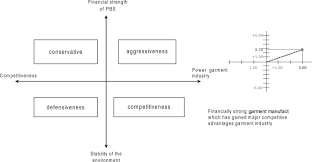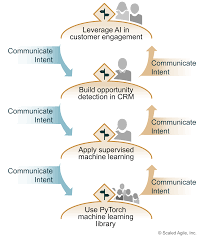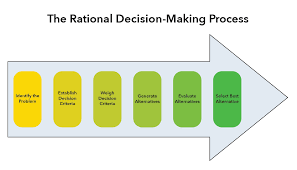Holistic Decision Making: A Comprehensive Approach to Better Choices
In today’s fast-paced and complex world, making decisions can often feel overwhelming. Whether it’s choosing a career path, making financial decisions, or deciding on personal matters, we are constantly faced with choices that can have a significant impact on our lives. This is where holistic decision making comes into play.
Holistic decision making is an approach that considers the interconnectedness of various factors when making choices. It goes beyond simply weighing pros and cons or relying solely on logic. Instead, it takes into account the bigger picture, including our values, emotions, intuition, and the impact our decisions may have on different aspects of our lives.
One of the key principles of holistic decision making is understanding that everything is interconnected. Every choice we make has ripple effects that can extend far beyond the immediate outcome. By considering how our decisions align with our core values and goals, we can ensure that we are moving in a direction that feels authentic and meaningful to us.
Another important aspect of holistic decision making is acknowledging the power of intuition. Sometimes, gut feelings or intuitive nudges can provide valuable insights that logic alone may not reveal. By tapping into our intuition and listening to our inner voice, we can gain a deeper understanding of what truly resonates with us and make choices that align with our authentic selves.
Furthermore, holistic decision making encourages us to consider the long-term consequences of our choices. It prompts us to think beyond immediate gratification or short-term gains and evaluate how our decisions may impact various aspects of our lives – be it relationships, health, career growth, or personal fulfillment.
To practice holistic decision making effectively, it’s important to cultivate self-awareness. This involves taking time for introspection and reflection to understand our values, priorities, strengths, weaknesses, and aspirations. By gaining clarity about ourselves and what truly matters to us in life, we become better equipped to make choices that are in alignment with our authentic selves.
Additionally, seeking different perspectives and gathering information from various sources is crucial in holistic decision making. It helps us to broaden our understanding of the situation at hand and consider different viewpoints. Consulting with trusted mentors, seeking advice from experts, and engaging in meaningful conversations can provide valuable insights that we may have otherwise overlooked.
Holistic decision making also emphasizes the importance of self-care and well-being. Recognizing that our physical, mental, and emotional states can significantly impact our ability to make sound decisions, it encourages us to prioritize self-care practices such as exercise, mindfulness, and stress management. By taking care of ourselves holistically, we enhance our overall well-being and improve our decision-making capacity.
In conclusion, holistic decision making offers a comprehensive approach to making choices that align with our values, aspirations, and overall well-being. By considering the interconnectedness of various factors, tapping into intuition, reflecting on long-term consequences, cultivating self-awareness, seeking diverse perspectives, and prioritizing self-care, we can navigate the complexities of decision making with greater clarity and confidence. Embracing a holistic approach empowers us to make choices that lead to a more fulfilling and purposeful life.
5 Frequently Asked Questions about Holistic Decision Making
- What is holistic decision making?
- How does holistic decision making differ from traditional decision making methods?
- What are the benefits of using a holistic approach to decision making?
- What techniques can be used to make better decisions using a holistic approach?
- How can organizations implement a more effective and efficient holistic decision-making process?
What is holistic decision making?
Holistic decision making is an approach to decision making that takes into account the interconnectedness of various factors and considers the broader context in which choices are made. It goes beyond a purely logical or analytical approach and incorporates elements such as values, intuition, emotions, and the potential impacts on different aspects of life.
In holistic decision making, the focus is not solely on evaluating pros and cons or maximizing outcomes in isolation. Instead, it involves considering the bigger picture, including personal values, long-term consequences, relationships, well-being, and the overall alignment with one’s authentic self.
This approach recognizes that decisions have ripple effects that can extend beyond immediate outcomes. It acknowledges that our choices can impact different areas of our lives such as career, relationships, health, personal growth, and overall happiness. By considering these interconnected elements when making decisions, we can strive for outcomes that are more balanced and aligned with our values and aspirations.
Holistic decision making also emphasizes the importance of intuition. It encourages individuals to tap into their inner wisdom and listen to their gut feelings or intuitive nudges when faced with choices. Intuition can provide valuable insights that may not be immediately apparent through logical analysis alone.
Additionally, holistic decision making involves self-awareness and reflection. It requires individuals to understand their own values, strengths, weaknesses, desires, and aspirations. By gaining clarity about themselves and what truly matters to them in life, they can make decisions that are more authentic and meaningful.
Seeking different perspectives and gathering information from diverse sources is another important aspect of holistic decision making. It helps to broaden understanding of a situation by considering various viewpoints and insights. Consulting with trusted mentors or experts and engaging in meaningful conversations can provide valuable input when making decisions.
Overall, holistic decision making aims to bring a comprehensive perspective to the decision-making process. By considering the interconnectedness of factors like values, intuition, long-term consequences, self-awareness, diverse perspectives, and well-being, individuals can make choices that align with their authentic selves and lead to a more fulfilling and purposeful life.
How does holistic decision making differ from traditional decision making methods?
Holistic decision making differs from traditional decision-making methods in several key ways. Here are some of the main differences:
- Consideration of interconnectedness: Traditional decision-making methods often focus on analyzing isolated factors and weighing pros and cons. In contrast, holistic decision making recognizes that everything is interconnected and considers the broader context in which decisions are made. It takes into account how different aspects of our lives, such as relationships, health, and personal values, may be affected by our choices.
- Integration of intuition: While traditional decision-making methods heavily rely on logic and rational analysis, holistic decision making acknowledges the power of intuition. It encourages individuals to tap into their gut feelings or inner wisdom when making choices. Intuition can provide valuable insights that may not be immediately apparent through logical reasoning alone.
- Emphasis on long-term consequences: Holistic decision making encourages individuals to consider the long-term consequences of their choices rather than focusing solely on short-term gains or immediate outcomes. It prompts individuals to evaluate how decisions align with their long-term goals, values, and aspirations.
- Self-awareness and personal values: Holistic decision making places a strong emphasis on self-awareness and understanding one’s own values, strengths, weaknesses, and aspirations. By gaining clarity about oneself and what truly matters in life, individuals can make decisions that align with their authentic selves.
- Inclusion of diverse perspectives: Unlike traditional decision-making methods that may rely solely on individual judgment or a limited set of opinions, holistic decision making encourages seeking diverse perspectives. It involves consulting with trusted mentors, seeking advice from experts, and engaging in meaningful conversations to gain a broader understanding of the situation at hand.
- Focus on well-being: Holistic decision making recognizes the importance of considering one’s overall well-being when making choices. It emphasizes self-care practices such as mindfulness, stress management, and physical health as factors that can impact an individual’s ability to make sound decisions.
In summary, holistic decision making takes a more comprehensive and interconnected approach compared to traditional decision-making methods. It integrates intuition, considers long-term consequences, emphasizes self-awareness and personal values, includes diverse perspectives, and prioritizes well-being. By considering these aspects, individuals can make choices that align with their authentic selves and lead to a more fulfilling and purposeful life.
What are the benefits of using a holistic approach to decision making?
Using a holistic approach to decision making offers several benefits that can greatly enhance the quality and outcomes of our choices. Here are some key advantages:
- Comprehensive Perspective: Holistic decision making allows us to consider a wide range of factors and their interconnections. By looking at the bigger picture, we can gain a deeper understanding of the potential impacts and consequences of our choices. This helps us make more informed decisions that take into account various aspects of our lives.
- Alignment with Values: A holistic approach encourages us to reflect on our core values and beliefs. It prompts us to align our decisions with what truly matters to us, ensuring that our choices are in harmony with our authentic selves. This alignment enhances personal satisfaction, fulfillment, and a sense of purpose.
- Long-Term Thinking: Holistic decision making emphasizes considering the long-term consequences of our choices. It helps us move beyond immediate gratification or short-term gains and encourages us to evaluate how our decisions may affect different areas of our lives over time. This forward-thinking perspective promotes better planning and more sustainable decision-making.
- Intuition and Creativity: By incorporating intuition into the decision-making process, holistic approaches allow for tapping into subconscious insights and creative thinking. Intuition can provide valuable guidance when logic alone may not be sufficient or when faced with complex or uncertain situations.
- Enhanced Problem-Solving: Holistic decision making encourages a multidimensional analysis of problems or challenges before making decisions. It prompts us to explore various perspectives, seek diverse opinions, and consider alternative solutions, leading to more effective problem-solving outcomes.
- Reduced Regret: Taking a holistic approach minimizes the chances of regretting decisions made solely based on one aspect or overlooking important considerations. By considering multiple factors, we can make choices that align with our values, goals, and overall well-being, reducing the likelihood of future regrets.
- Improved Well-being: Holistic decision making recognizes the importance of self-care and well-being in the decision-making process. By prioritizing self-care practices, such as mindfulness, stress management, and maintaining a healthy work-life balance, we can make decisions from a place of clarity and emotional stability, leading to improved overall well-being.
In summary, adopting a holistic approach to decision making offers numerous benefits. It enables us to make more informed choices that align with our values, consider long-term consequences, tap into intuition and creativity, enhance problem-solving abilities, reduce regret, and prioritize our well-being. By embracing a holistic perspective, we can navigate decision-making processes more effectively and lead more fulfilling lives.
What techniques can be used to make better decisions using a holistic approach?
When it comes to making better decisions using a holistic approach, there are several techniques that can be employed. Here are a few effective ones:
- Reflect and Clarify: Take time to reflect on your values, priorities, and long-term goals. Clarify what truly matters to you in different aspects of your life. This self-reflection helps create a foundation for decision making that aligns with your authentic self.
- Consider the Interconnectedness: Recognize the interconnected nature of different areas of your life. Understand how decisions in one area may impact other aspects such as relationships, health, or career. Take a step back and evaluate the bigger picture before making choices.
- Intuition and Gut Feelings: Pay attention to your intuition and gut feelings. Sometimes, our subconscious mind holds valuable insights that logic alone may not reveal. Trusting your instincts can provide valuable guidance when faced with complex decisions.
- Gather Information: Seek out diverse perspectives and gather information from various sources. Engage in conversations with trusted mentors or experts who can offer different viewpoints or insights that you may have overlooked. This helps broaden your understanding of the situation and enhances decision-making capabilities.
- Mindfulness and Emotional Awareness: Practice mindfulness techniques to cultivate present moment awareness and emotional intelligence. Being aware of your emotions and thoughts during the decision-making process can help you make choices that are not solely driven by immediate desires or impulses.
- Long-Term Consequences: Consider the potential long-term consequences of your decisions across different areas of life – personal, professional, relationships, health, etc. Evaluate how each choice aligns with your overall goals and values in the long run.
- Test Your Decision: Before finalizing a decision, consider testing it through visualization or thought experiments. Imagine yourself having made the decision and observe how it feels emotionally, mentally, and even physically. This technique can provide insights into potential outcomes and help you gauge the alignment of the decision with your holistic well-being.
- Seek Balance: Strive for balance in decision making by considering both rational analysis and intuitive insights. Avoid getting overwhelmed by one aspect and try to find a middle ground that integrates logic, intuition, and emotions.
Remember, holistic decision making is an ongoing process that requires practice and self-awareness. By incorporating these techniques into your decision-making approach, you can make choices that are more aligned with your values, aspirations, and overall well-being.
How can organizations implement a more effective and efficient holistic decision-making process?
Implementing a more effective and efficient holistic decision-making process within organizations can greatly enhance decision-making outcomes and overall organizational success. Here are some key steps to consider:
- Foster a Culture of Collaboration: Encourage open communication, collaboration, and knowledge-sharing among team members. Create an environment where diverse perspectives are valued, and individuals feel comfortable expressing their ideas and concerns.
- Clearly Define Organizational Values and Goals: Establish clear values and goals that align with the organization’s mission. These serve as guiding principles for decision making and help ensure that choices are in line with the organization’s overall vision.
- Develop Decision-Making Frameworks: Create structured decision-making frameworks that incorporate holistic considerations. This could involve identifying key factors to consider, establishing criteria for evaluating options, or utilizing decision matrices or models that account for multiple dimensions.
- Gather Comprehensive Information: Encourage the collection of comprehensive information from various sources before making decisions. This includes quantitative data, qualitative insights, expert opinions, industry trends, customer feedback, and internal feedback from employees at different levels.
- Encourage Intuition and Emotional Intelligence: Acknowledge the importance of intuition and emotional intelligence in decision making. Provide training or workshops that help employees develop their intuition skills and emotional intelligence to better understand their own feelings and those of others when making choices.
- Promote Systems Thinking: Emphasize the interconnectedness of different aspects within the organization. Encourage employees to consider how decisions impact various departments, stakeholders, processes, and long-term goals rather than focusing solely on isolated outcomes.
- Implement Decision Review Processes: Establish regular review processes to evaluate decisions made using a holistic approach. This allows for continuous learning and improvement by analyzing outcomes, identifying lessons learned, adjusting strategies if needed, and applying insights gained from previous decisions.
- Invest in Employee Development: Provide ongoing training opportunities focused on critical thinking skills, problem-solving techniques, creativity enhancement exercises, conflict resolution strategies, and effective communication. This equips employees with the necessary skills to engage in holistic decision making.
- Embrace Technology and Data Analytics: Leverage technology tools and data analytics to support decision-making processes. This can include using data-driven insights, predictive analytics, and modeling techniques to inform decisions and enhance understanding of potential outcomes.
- Lead by Example: Leadership plays a crucial role in promoting holistic decision making within organizations. Leaders should model the behavior they expect from their teams by demonstrating transparency, actively seeking diverse perspectives, considering long-term implications, and incorporating holistic thinking in their own decision-making processes.
By implementing these steps, organizations can cultivate a more effective and efficient holistic decision-making process. This approach ensures that decisions are well-informed, aligned with organizational values and goals, and consider the interconnectedness of various factors within the organization’s ecosystem. Ultimately, it leads to better outcomes, increased employee engagement, and overall organizational success.



